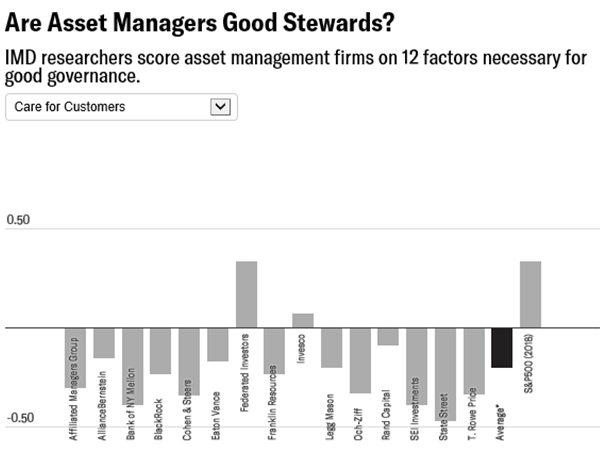
 |
Corner Office
Asset Managers
Among the Worst-Governed Public Firms, Study Finds |
Even firms like BlackRock and State
Street that advocate for good governance score poorly for
accountability and long-termism in a new analysis.
June 22, 2018
 |
|
Illustration by II |
Major shareholder activists such as
BlackRock and State Street speak out on governance issues at the
public companies they invest in. But do these asset managers actually
practice what they preach?
A new measure of governance quality
developed by researchers at Swiss business school
IMD suggests
the answer is no.
The stewardship rating grades listed
companies on qualities such as accountability, long-term focus, care
for customers, trustworthiness, and prudence. IMD professor Didier
Cossin created it with Stewardship Asia Centre chief executive Ong
Boon Hwee for their 2016 book, “Inspiring Stewardship.”
“A good business creates value to
society, rather than extracting it,” explained Cossin, who also serves
as director of the IMD Global Board Center and president of the
Stewardship Institute,
which he founded. “It’s a concept people generally understand, but
isn’t reflected in the market.”
Even standard environmental, social, and
governance metrics often fail to separate good stewards from bad,
Cossin argued. Commonly used governance criteria — such as whether a
board has independent directors — don’t necessarily translate to good
stewardship, and can be faked, he said.
To better capture how companies perform
in areas like risk management, alignment with stakeholders, and
innovation, Cossin used natural language analysis to rate companies
based on their own public statements, including 10-K reports and the
like.
A company that frequently used words
like “currently” or “quarterly” might rank worse on long-termism than
a company more often said things like “future” or “decade,” for
instance. Similarly, words like “litigation” and “petition” would
imply worse relationships with stakeholders than comments regarding
“communities” or “transparency.”
In one particularly telling example,
Wells Fargo — which came under fire last year for having created
millions of fake accounts — used the word “customer” only twice in its
2014 reports, according to Cossin.
When the stewardship language analysis
was applied to asset managers, the results were bleak.
“Asset managers are supposed to be well
stewarded, but they’re among the worst,” Cossin said.
Asset managers scored below the average
S&P 500 company in eleven out of twelve dimensions included in the
study: accountability, care for customers, harmony with stakeholders,
innovativeness, long-term focus, passion, positivity, proactiveness,
prudence, purposefulness, and trustworthiness. The only area in which
the average asset manager did better than the typical large public
company was identification, a measure of the sense of ownership and
identity associated with a company.
Even firms that have taken public
stances on issues like
climate change
and
board diversity generally
performed worse than the average S&P 500 company. BlackRock, in fact,
did worse across all 12 dimensions, though it came close to the
typical large-cap company on passion, or expressions of engagement.
Compared to other asset managers,
BlackRock scored well on measures of innovation, passion, positivity,
proactivity, prudence, and trustworthiness.
State Street, meanwhile, earned its
highest marks on identification, outperforming the average asset
manager as well as the broader S&P 500. The firm lagged the typical
large-cap company in every other category, but outscored its peer
average on innovation, passion, positivity, and prudence.
The best performing asset management
firm was T. Rowe Price. The Baltimore-based company outscored both its
peers and the average S&P 500 member on accountability,
identification, prudence, purposefulness, and trustworthiness.
Cossin
and his research partner Abraham Hongze Lu concluded that T. Rowe
Price benefited from being a “pure play” asset manager – in other
words, not having as many “distractions and conflicts” as multi-asset
managers.
These conflicts – such as simultaneously
trying to serve both company shareholders and investors in their funds
— can complicate governance for asset management firms, they
explained.
Governance problems correlated with
worse financial performance. Cossin said the public companies that
scored best on his stewardship rating exhibited less down-side risk,
with their stocks performing better in market downturns.
“Doing the right thing has the better
chance of making money,” he said.
xxx
 |
*Average scores
refer to a peer group of 76 publicly-held asset managers and
custody banks.
|
|
© 2018 Institutional Investor LLC. |
|



